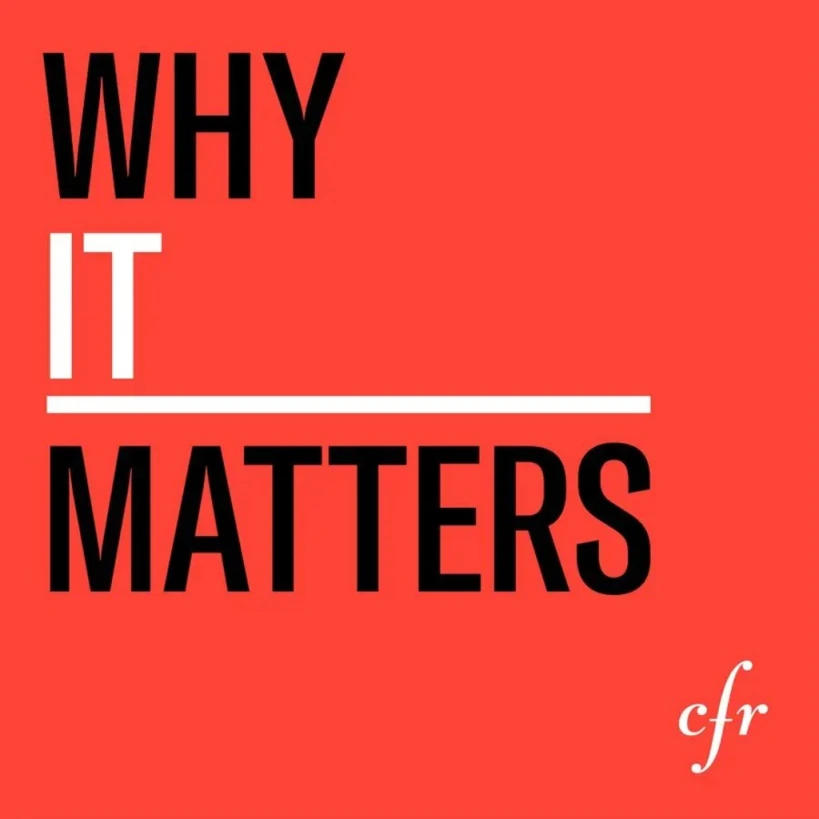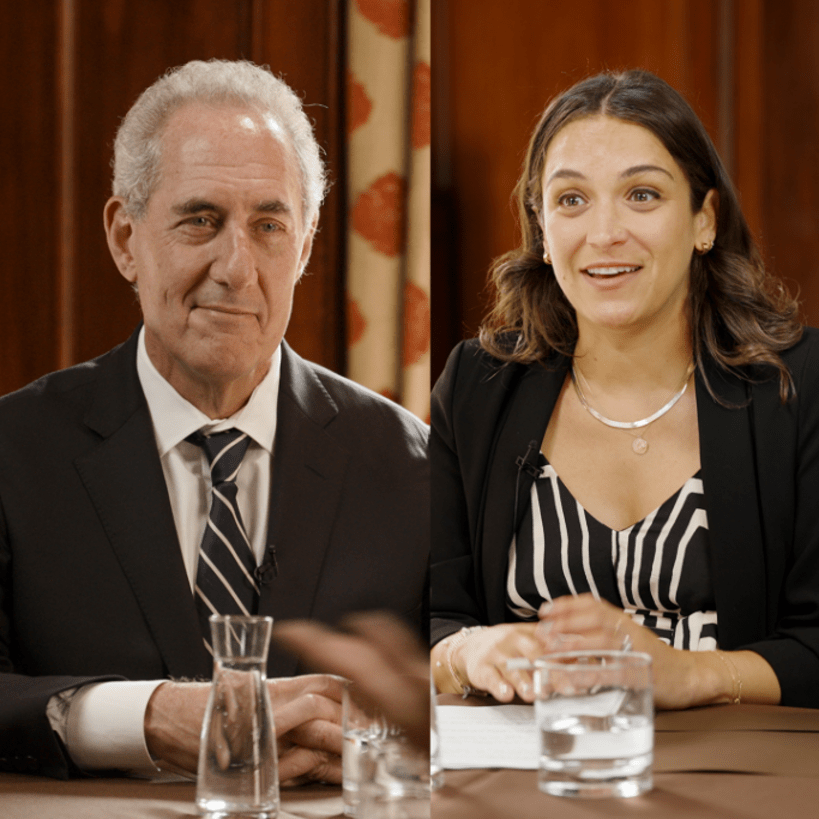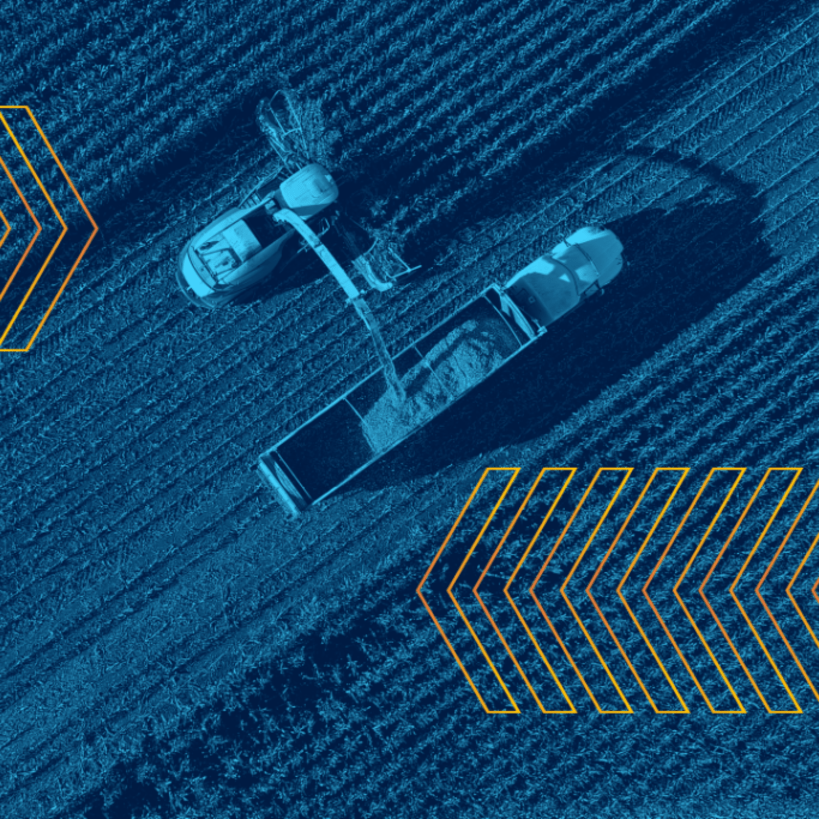Pricing Our Climate
As the effects of climate change move from scientific predictions to daily headlines, some investors have begun sounding the alarm about impending dangers to financial markets. In this episode, experts break down the intersection of climate change and the economy, and examine whether the persuasive power of the dollar can be leveraged in the fight for climate action.
Published
Host
- Gabrielle SierraDirector, Podcasting
Guests
- Kate MackenzieGreen Columnist, Bloomberg
- Michael GreenstoneProfessor of Economics, University of Chicago
Supervising Producer
- Asher RossLead Content Strategist
Audio Producer and Sound Designer
Associate Podcast Producer
- Rafaela Siewert
Senior Producer
- Jeremy SherlickDirector, Video
Show Notes
In early 2020, BlackRock CEO Larry Fink penned a letter laying out the long-term investment risks posed by climate change. It brought attention to the ways shifting consumer sentiment, regulation, and physical risk all could alter the playing field. But even as some pension fund managers and other investors with long time horizons are increasingly planning for climate change, much of Wall Street is continuing business as usual. What incentives and policies are needed before markets will unleash their power in the fight for climate action?
From CFR
“The Coming Climate Disruption, With Alice C. Hill,” The President’s Inbox
“Envisioning a Green New Deal: A Global Comparison,” Andrew Chatzky
“OPEC in a Changing World,” Andrew Chatzky and Anshu Siripurapu
“Adapt or Perish,” Alice C. Hill and Leonardo Martinez-Diaz, Foreign Affairs
Read More
“What Financial Markets Can Teach Us About Managing Climate Risks,” Michael Greenstone, New York Times
“A Fundamental Reshaping of Finance,” Larry Fink, BlackRock
“Can Wall Street save us from climate change?,” Washington Post
“How much can financiers do about climate change?,” Economist
“The Catastrophic Risks of Climate Change: The US Turns Its Back on the World,” Alice C. Hill, Lawfare
“Ten facts about the economics of climate change and climate policy,” Brookings Institution
“Climate Change’s Giant Impact on the Economy: 4 Key Issues,” New York Times
Watch or Listen
“Why climate change means new risks for U.S. financial markets,” PBS Newshour
“Investing in the age of climate change,” Financial Times
“What is Climate Change?,” Al Jazeera
“How Energy Got So Cheap,” Wall Street Journal
Transcript
Gabrielle SIERRA: So I saw this cartoon the other day, and it showed two dinosaurs and they were looking up at this giant meteor and one yells to the other ‘Oh, no, the economy’. And you know, it just makes you think, do you think there’s something absurd about looking at this existential problem from a financial standpoint?
Kate MACKENZIE: Yeah, I absolutely do actually have a lot of sympathy for that argument. Yeah, there’s a school of thought, which is that, you know, talking about things in terms of the economy tends to make people listen, who might not otherwise want to listen or be inclined to listen. And, a lot of people feel that it’s safer to talk about climate change in the context of finance and the economy. Being in the US people are very nervous about straying into something that they think is political or politicized. And that, in turn, has created this kind of aversion to talking about it in a really broad and robust way. And, unfortunately, it’s a simple rubric for kind of analyzing and thinking about climate change. It does make it kind of easier for people to get their heads around.
CNN: 0:00 “Now to a dire warning about climate change. According to a new report, experts say that we have until 2030 to avoid catastrophe. It also says if unprecedented changes are not made, and made soon, there will be irreversible damage to the planet.” https://www.youtube.com/watch?v=RvaCM1TNBBk
Al Jazeera: 0:52 “One of the world’s coldest regions is witnessing a record number of wildfires. The heatwave has lit a match to the arctic.” https://youtu.be/pluxAS6w9_8?t=52
CNN: 1:29 “We’ve had, of course, more record floods, we have more significant droughts, we have all these events.” https://youtu.be/RvaCM1TNBBk?t=89
The University of Michigan: 0:38 “People start to recognize that this isn’t some hypothetical future. This is our present reality, and it’s going to cost us money, and it is costing us money.”https://www.youtube.com/watch?v=hljxn7NQ7t8
Climate change is the most important issue of our lives. But time and again it seems to take a back seat to more immediate problems. The evidence is clear - wildfires, drought, heatwaves, extreme weather and flooding have moved from scientific models to daily headlines. And yet there are still so many powerful interests that want to deny the problem, or delay dealing with it.
But in the face of reluctance, one surefire way to get someone’s attention, is to take aim at their wallet. Money talks, and that remains true even when it comes to saving the planet. So we were curious, how do markets, investments, and climate change intersect?
I’m Gabrielle Sierra, and this is Why It Matters. Today, the economic dilemma of climate change and whether or not financial markets can make a difference.
SIERRA: So do you think you can give us some of the big climate updates for the last year because 2020 has been a bit of a rough one. And I think that a lot of people have been distracted from the long term.
MACKENZIE: 2020 has been talked about in the last few years, by a lot of climate experts as a really important year. It’s the point at which we would expect to start seeing emissions decline.
My name is Kate Mackenzie. I write a column for Bloomberg Green. I also advise organizations that are working towards achieving the Paris Agreement goals in all kinds of capacities.
So we sometimes call that “bending the curve”, because our annual emissions have been increasing most years for obviously, you know, many, many decades now. And that’s the first thing that needs to change is that annual growth rate needs to really end and start reversing at a fairly steep rate. Because there’s obviously a lot less air travel and certain other kinds of transit in particular and activity, obviously, emissions are down this year. It’s not really clear whether that’s going to be permanent and it’s not clear at what point you know, that might rebound. And, you know, we don’t want a lot of these particular changes to be permanent because they’re so harmful. We need to cut those emissions in other ways.
Are we on the right track? There’s a lot of encouraging signs. But there’s also a lot of causes for concern. The overall emissions trajectory, if you kind of plot it out on a chart, it’s still not on a pathway that we should be on. There’s also, I guess, questions about the international process and the extent to which countries are meeting their commitments under the Paris agreement to target cutting their emissions and whether they’re actually doing that quickly enough and keeping up with the schedule. The big UN Climate meeting that usually takes place at the end of the year is postponed this year, until late next year. But that process is still continuing in the background where countries are still being asked to look at their emissions plans, look at their long term plans and talk about how they’re actually planning to cut their emissions to get to net zero by 2050.
SIERRA: Alright, so it sounds like we still have a lot of work to do. Can’t, shouldn’t rely on a pandemic to get us to do the right thing for the environment.
MACKENZIE: Yeah, definitely not.
Even before we were grappling with a public health crisis, the United States was moving away from important climate initiatives. At the end of 2019, the Trump administration formally announced that it would withdraw the US from the Paris Agreement, abandoning nearly 200 countries that had pledged to reduce greenhouse gas emissions.
Many experts feel that this agreement is the world’s last and best shot at keeping the globe from reaching the temperature of no return - a 2-degree celsius increase from pre-industrial levels.
A big part of the administration’s rationale for leaving the agreement was that it presented a threat to the U.S. economy - this argument that has struck many economists and climate scientists as misguided, given the dire economic threats of climate change itself.
MACKENZIE: So there’s two main ways to think about climate change in financial markets. If you think about things that you own or things that can be bought and sold on financial markets, these can be affected in two main ways by climate change. One is, as the world moves away from what we call a carbon intensive economy, companies and assets that have assumed that that won’t happen will lose value. The best example, I suppose, would be something like coal fired power stations.
Investing your money in a coal company is a prediction. By investing, you’re saying, “I believe that this coal company will be more valuable in the future than it is now.” If your prediction is wrong, and climate regulations and renewable energy sources eliminate the demand for coal, the company loses value, and you lose money.
MACKENZIE: At the moment, a large proportion of the world’s coal fired power stations are no longer profitable. This is largely because renewable electricity has become so much cheaper to generate. So that, you can actually build new renewable energy resources for cheaper than running existing coal fired power plants in a lot of places now. As that’s happened, obviously, if you’re a company that runs those power plants, or owns the mines that supply those power plants, investors are not very keen on your shares anymore or on investing in your bonds, because you’re not gonna be able to pay them back. So that’s a really present example. You can see there are similar things starting to happen in the oil industry, there have been growing signs that oil is not going to have this infinitely, endlessly growing market that has often been assumed in the past. So that’s just one side of it. And then the other side is what is often called “physical risk.” Which is things getting damaged businesses, buildings, crops, people’s ability to work, all of these things being affected by the impacts of climate change itself. And that’s another way that you can see financial losses accrue from climate change.
Physical risk is not theoretical, it’s already causing serious damage to corporations and economies. A University of Maryland study found that disruptions to global supply chains from weather doubled in 2017. Just this year, Pacific Gas and Electric, California’s largest utility, declared bankruptcy due to billions in liabilities from wildfires. Google is making contingency plans to cool its data centers as temperatures rise. The Climate Disclosure Project, estimates roughly $1 trillion in total business costs in the coming decades.
SIERRA: Interesting. So it seems like the two main things are 1.) it will affect your product because people won’t want to buy it or invest in it, right? If it’s a product that’s no longer, environmentally friendly, or even sustainable. And the other way is that your building could get destroyed, your plant could get destroyed. So climate change affects you on those two basic levels.
MACKENZIE: Yeah, that’s it exactly. The other thing about financial markets is that they’re forward-looking by nature. So once enough participants in a market can see these changes emerging or approaching, that starts to be what we would call “priced in.” So people start changing their idea of the value of an asset because they can see in the future that this loss is going to happen.
As these problems become more clear, some investors are starting to get better at predicting climate risk, and are demanding that the companies they invest in do the same. One example is Norway’s trillion-dollar sovereign wealth fund, which has pledged to use its influence to force companies to behave more responsibly. But the trend had its most visible moment earlier this year, following a letter written by BlackRock CEO, Larry Fink.
Killik: 0:13 “Climate change is very much back on the agenda, following the publishing of a letter from BlackRock’s chief executive, Larry Fink.” https://youtu.be/TremkEfUpjA?t=12
CNBC: 0:04 “Fink’s annual letter is out. The world’s largest asset manager now announcing the firm will make investment decisions with environmental sustainability at its core.” https://youtu.be/ulU_tw81dAk?t=4
RT America: 0:06 “Asset manager BlackRock handles over $7 trillion in direct management, and another $20 trillion through their proprietary software.” https://youtu.be/96sAffLWy_8?t=5
MACKENZIE: So BlackRock invests money on behalf of other people, they manage those investments on behalf of largely things like pension funds, so, you know, where you and I would hopefully be having some savings for our retirement, that fund might then you know, pass that money to BlackRock to decide how to allocate it into different companies and different asset classes. BlackRock is the biggest company that offers this kind of service of asset management in the world. They’re therefore a very powerful entity, you know, they own a little chunk of almost every company in the world. So when they write to the CEOs of those companies or the directors and CEOs, it’s often seen as a, you know, an important signal, even though it’s just a letter.
So, he wrote to company directors, basically saying that they would be expecting more disclosure from the companies. So disclosure is a huge area of interest both for investors and companies when they talk about climate change and financial climate risk. The idea is that if the company can identify and then disclose what climate risks it thinks it’s exposed to, then investors can make their decision about whether they think the company is well set up for the future or not. Larry Fink also reiterated in this letter, a threat that had been made a couple of years earlier, which is that they would vote against the reappointment of company directors if they feel that the company or that those directors are not adequately disclosing their climate risk or a strategy to address climate change. There’s quite a lot in the Larry Fink letter. He makes it clear that this is about profitability, this is about returns. So, as is often the case where you have climate change being discussed in the financial world, he’s emphasizing that it’s not necessarily a political or a moral agenda. It’s just a traditional finance agenda, traditional focus on investment returns and investment risks. And it’s just looking at these emerging and new influences on those returns and risks, which is in this case climate change.
SIERRA: So just a good business decision.
MACKENZIE: Exactly. And that’s very often how it’s portrayed and how it’s framed and how it is understood in the financial world.
Michael GREENSTONE: So I think Larry Fink’s letter was terrific, and in many respects, is emblematic of some recent activity from the corporate sector.
My name is Michael Greenstone and I’m a professor of economics at the University of Chicago and I direct the Energy Policy Institute as well as the Becker Friedman Institute, both at the university here.
In addition, Dr. Greenstone served as the chief economist of the Council of Economic Advisors under the Obama administration. Later, he started a non-profit called “Carbon Vault” that allows individuals and businesses to offset their carbon footprints.
GREENSTONE: But what its emblematic of is a recognition that there has not been appropriate policies in response to the climate risk. And so, you’ve seen individuals and you’ve seen corporations start to try and take a leadership role. There’s limits to what any individual corporation can accomplish, but you started to see that. I see BlackRock’s letter as kind of a shot across the bow in terms of raising consciousness and activating shareholder activism. And that’s important. It’s certainly not the same thing as forceful policy. There have also been some other important examples. I think Microsoft and Apple have been absolute leaders in terms of taking on reductions in their own emissions, in very, very thoughtful and careful ways, it’s not an easy thing to do. For reasons we could unpack for many more hours than any reasonable listener would be interested in. But they stand out as real leaders.
I think it’s also true that in that wave of interest, there have been a lot of others who have been closer to greenwashing. And by that I mean saying something publicly, but the actions not having been very consequential and that can show up in buying carbon offsets that are unverifiable, very inexpensive, or, you know, incentivizing aims to purchase renewable electricity. That can be done in a way that is really additive. But most of the time, it’s done by paying very small amounts to wind generation farms in Texas and Oklahoma that would have been operating anyway. So it looks good, but has very little impact.
SIERRA: What does it mean to assess climate risk? How do you measure something like that?
MACKENZIE: That’s such a complicated question.
SIERRA: (Laughs) Break it down.
MACKENZIE: And so many people are working on this very question in so many different ways. So you can look at it in a fairly straightforward way. In the first type of climate risk, which is often called ‘transition risk’ so it’s about that transition away from emissions, where you might have you know, renewables replacing coal. That is often initially assessed by looking at a company or another kind of issuing entity, looking at how much does their business model rely on producing things or selling things that are very high emissions, and how easy is it, and how willing is that company to change? There would be very few financial services companies that don’t at least avail themselves to that type of analysis.
It gets a lot more complicated when you’re talking about companies that maybe aren’t producing fossil fuels themselves and maybe aren’t burning it themselves, but they’re dependent on other industries that do use emissions or that do generate greenhouse gas emissions. So if you’re looking at, say, a car manufacturer, they’re only emitting greenhouse gases in their production of the cars. But then you’d be looking at their strategy. Are they moving towards low emissions vehicles and electric vehicles? How much of their business is dedicated to this currently? Are they still expecting to be selling gas guzzling SUVs, which tend to be, you know, fairly profitable at the moment? Are they banking on that being a big part of their business model for years to come? And that’s where it gets into a little bit more of the art of looking at their strategy and their long term planning.
SIERRA: Could you walk me through how climate change might affect businesses that aren’t so clearly connected to it? You know, I’m thinking more about companies like Coke or Nike or a pharmaceutical company. I mean, is this something that you think will affect all businesses in one way or another?
MACKENZIE: Yeah, it’s interesting, actually, those sorts of companies, companies in those consumer-facing industries have tended to be more proactive in looking at their role in reducing emissions than a lot of other industries. And in fact, it’s often wildly financially advantageous, if you switch to renewable energy. And you can also tell your consumers, you know, you can also tell people about how great and green you are as a company. For those companies, it’s also a question of, to what extent things like the availability of water might be impacted by climate change, transport, supply chain systems that they rely on. So things like water availability are something that a lot of companies have been looking at for years now. Extreme heat, storms and cyclones, things like that.
SIERRA: So basically, it’s just them analyzing whether or not they will be able to make their products in the same way in 10 or 20 years as the effects pile up.
MACKENZIE: Exactly. And get them to people that they sell them to ultimately.
SIERRA: So if you would play my financial advisor for a second, because I don’t have one. Are the odds good that as climate risk becomes more clear that Wall Street could become like an ally in the fight for climate action? Is that a good bet?
MACKENZIE: It’s interesting because, you know, in a sense because some investment managers, particularly the ones that are looking after people’s pensions, they are obliged to think about the long term. Pension funds are actually legally obliged in many parts of the world to think about the long term interests of the members of their fund. So I think it’s no coincidence that those sorts of pension funds have been at the forefront of thinking about climate change in the financial world. Investment banks tend to do quite a few other activities that tend to be more short term in focus, you know, M&A deals, IPOs and so on. So I think investment banks are probably coming to this topic a bit later than some of their financial peers that are closer to the pension fund sector. There are some people who will say, ‘Well, if climate change is a financial risk, perhaps, the markets and financial self interest can, can solve it’. If we had a lot more time to make these changes, I guess I would be more sympathetic to that argument.
So you know when you have a theory, and then it doesn’t exactly pan out? That seems to be the case here with whether financial markets can become climate allies on their own. As promising as the BlackRock letter and other trends appear - there’s still too much money to be made on fossil fuels and short term investments that ignore our planet’s future. And by the time physical risks hurt enough bottom lines to force a change, it may be too late.
We’re going to take a short break, but when we get back - what will it really take to change markets?
SIERRA: Do you think that regulation will be necessary before broad corporate change occurs?
MACKENZIE: Yeah, I absolutely think it is, and it will be really essential. Unfortunately, the thing about each individual business or bank, or investor that we look at, they’re all sitting on top of a very big system that has a lot of rules and conventions that did not evolve with climate change in mind. So, one very simple problem that is often discussed in this world is what’s called ‘time horizons’. So investors want to look at the report every three months or six months or a year of how their investments are performing. And they want to see that their investments are doing well. They’re not necessarily thinking about the longer term. And a lot of the financial system as it currently works, a lot of things like accounting rules, financial reporting rules, all of these rules evolved, really, without regard to long term impacts, but also without regard to the sort of the physical world that we exist in, in a sense. So, this is what economists call ‘externalities’. If you’re a company that can pollute, without bearing any of the cost of that pollution, then you’re almost obliged to do it, if that improves your profits, then you’re kind of almost expected to do it and, and obliged to do it, even if it has a really negative effect for, the rest of society.
It’s kind of challenging to think about but a lot of that needs to start shifting, in order for us as humans, to you know, have a kind of stable and safe world that we would like to be able to enjoy and we’d like our kids and grandkids to be able to enjoy.
Climate change is undeniable, but not all of its effects are not immediate. Transitioning your business model to become carbon neutral is expensive, and you don’t know when you’ll make the money back. Shareholders don’t like losses.
Many economists think the only answer is regulation. Governments can pass laws that make it expensive to produce carbon. Once you do that, the math changes. And markets have a new set of problems to solve. Transitioning your company to become carbon neutral is no longer a long-term adaptation, but an immediate business necessity.
SIERRA: So what do you see as the most effective types of regulations when it comes to emissions?
GREENSTONE: You know, the economics of it, the blackboard economics are kind of boring. It’s very simple. You just put a price or tax on the thing that you don’t like. And in that case, it’s co2. And then you let the market sort out as to where the cheapest reductions are going to come from.
And you know, there are very successful markets on that right now. The European Union has a very successful cap and trade program for co2. There’s 9 or 10, maybe it’s now 10 or 11 states along the east coast that are in the regional greenhouse gas emissions cap and trade. And California has one. And so those have been very successful.
For those who need it, here’s what you need to know about carbon regulations. The two big options are carbon taxes and what’s known as “cap and trade”.
A carbon tax is a tax placed on the amount of greenhouse gases produced by a company. The more carbon produced, the more the company has to pay the government. This establishes a direct cost for releasing emissions into the air. With cap and trade, the government defines the maximum amount of carbon that can be produced by companies in a given state, region, or country. Within this system, companies that produce more carbon emissions than their cap allows can buy the right to do so from companies that produce less. The goal is to allow the market to set the price of carbon, which in turn can drive investment and innovation towards green solutions. The pros and cons of each are hotly debated, but most agree that a well designed set of policies are the only sure way to reduce overall greenhouse gas emissions.
As advocates sought to promote these ideas, they came up with another term worth knowing - the “social cost of carbon”.
GREENSTONE: I like to call it the most important number you’ve never heard of. So the social cost of carbon is really pretty simple, once you cut through all the words. If I put a ton of co2 in the atmosphere today, what are the damages it’s going to cost to the economy, as long as that ton of co2 in the atmosphere? And I, under the President’s direction, Cass Sunstein and I had the idea that the United States government should have a social cost of carbon. And in 2009 and 2010, we led a process and set it, and if you were to follow through that number is about $51 a ton. And so, a way to say that in English is that every ton of co2, carbon dioxide, that we abate produces $51 of global benefits. So those benefits are reductions in climate damages.
You know, markets are constructions of people’s beliefs and government. And the governments really set the rules of the road and it’s hard to point to what markets would systematically have to react to if there isn’t government policy. And, you know, just returning to our conversation about BlackRock and Microsoft, I think their moves are very important. They raise awareness and they have some impact on carbon emissions. But realistically, it’s all pretty small relative to the government or governments around the world, setting a forceful climate policy and then markets would have something real and immediate to react to and they would. You would see a revaluation of companies based on their usage and production of fossil fuels.
And that’s good news. With the right policies and incentives, markets could unleash their power to help slow climate change, rather than fueling its acceleration. But there’s an important caveat to how far the policies of highly developed nations can go.
GREENSTONE: I think it’s very natural, as we sit here in the United States to be focused on US policy and what US corporations are doing, but I have a concern that sometimes we become excessively focused on that. And that concern is grounded in the fact that climate change, really it is global climate change. And, if one looks at the projections for the United States share of emissions going forward,I think it’s about 15% for the rest of the century. So, unless the rest of the world finds it advantageous to engage in reducing emissions, it’s going to be hard to make a lot of progress. And I think what can help is if we don’t think of it as the climate change crisis, but rather we think of it as the global energy challenge. And in particular, I see the global energy challenge as this challenge that all societies have to confront in their own way. And I think there’s three main goals that underpin this challenge. The first is how do you make sure that your society has access to inexpensive and reliable sources of energy, that power economic growth and allow people to improve their living standards and lead much more comfortable lives and they are currently. The second is, how do you do that without suffering the health effects of air pollution? And the reason they’re interlinked is because the very fossil fuels that often provide the least expensive sources of energy, also often involved the release of particulate matter. And that causes all kinds of health problems, as we’re seeing in India and China. And we saw previously, you know, several decades ago in the United States.
And then the third leg of the stool, I think is that the same fossil fuels that are inexpensive and it can lead to very pernicious air pollution also, are increasing the odds of disruptive climate change. And what societies, this is the United States, this is India, this is China, this is countries in Sub Saharan Africa, it’s Bangladesh, Pakistan, all have to figure out is a way to balance and navigate between those three goals. And if the climate, if the global energy challenge looks like it’s going to involve massively more expensive energy, it’s going to be very difficult to bring people in other countries along and I think one example that’s very instructive. I do a lot of work in the state of Bihar. In India, their per capita, electric annual per capita electricity consumes about 200 kilowatt hours per year. In the United States, it’s 13,000. So trying to get people in Bihar, focused on climate risk, when they’re at about 200 kilowatt hours per year, is very, very challenging. And so all of that points to it’s not enough for the United States to find a way to reduce carbon emissions. But it’s critical for the United States and the world to identify innovations that, kind of, can soften some of the trade offs associated with that global energy challenge and a lot of that’s going to turn on innovation and reducing the costs of clean energy and/or reducing the costs of carbon removal technologies.
Two dinosaurs looking up at a meteor, and one says “Oh, no, the economy.” We get it. Once the world ends, there’s no more economy to worry about. But, that doesn’t mean that it’s not worth talking about climate change in economic terms. Doing so gives us a common language for addressing the facts and clarifies the idea that nobody is going to turn a profit unless we get our act together. Money talks, and while climate change can only be mitigated by global solutions, the richest country on earth does still have the world’s ear. If the US can make the right changes at home, and regain its global leadership, it could do some very loud talking indeed.
SIERRA: Do you think that a climate skeptic might be more convinced of the problem when banks and insurance companies and not just climate scientists are telling them ‘No, we can’t insure that house’, ‘No, you can’t have a loan to build on the coast, because from our analysis, those places won’t exist in 20 years’? I mean, do you think that that will and does bring new people into the conversation?
GREENSTONE: There is little more powerful than price signals reverberating through the economy. What do I mean by ‘price signals’? Exactly what you said. ‘Hey, I’d like to get insurance on my house on the New Jersey coast’ and the insurance companies’ rates have just gone up by five times’, that’s going to get people’s attention. And so to the degree that there are physical impacts that start to get priced, that is gonna matter a lot. And to the degree that there’s policy that starts to get priced into assets, that’s going to matter a lot. And I think there’s no amount of asking for people’s charity that is comparable to people facing very clear and very strong price signals.
Want to learn more about the role of markets and the economy in climate change? Head to CFR.org/WhyItMatters for the show notes from this episode.
Interested in saying ‘hey’ to the Why It Matters team? You can always reach out on email at [email protected].
If you are a fan, subscribe to the show on Apple Podcasts, Spotify, Stitcher, or wherever you get your audio. And if you like what you hear, leave us a review!
And hey, if you’ve got the time to get even more specific, we’re running a survey over at cfr.org/podcast-survey.
Why It Matters is a production of the Council on Foreign Relations. The show is created and produced by Jeremy Sherlick, Asher Ross, and me, Gabrielle Sierra. Our sound designer is Markus Zakaria and our summer intern is Wynne Dieffenbach. Robert McMahon is our Managing Editor, and Doug Halsey is our Chief Digital Officer. Kayla Ermanni provided us with extra help on this episode.
Original music is composed by Ceiri Torjussen. Special thanks go to Richard Haass and Jeff Reinke.
For Why It Matters this is Gabrielle Sierra, signing off see you soon!






